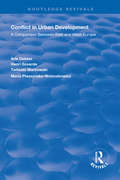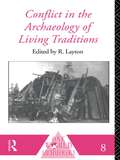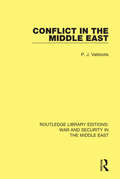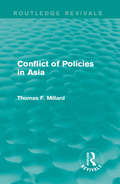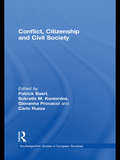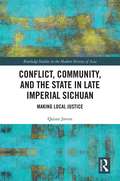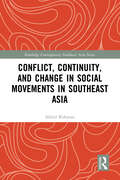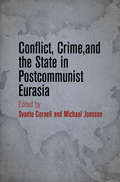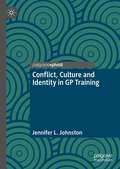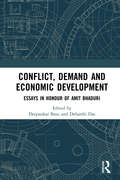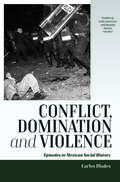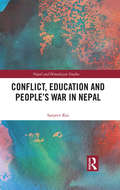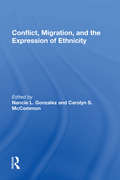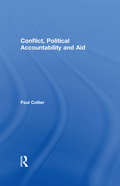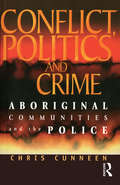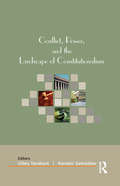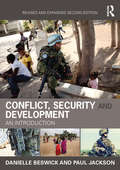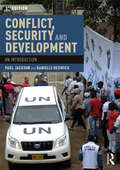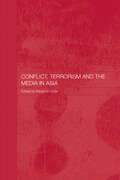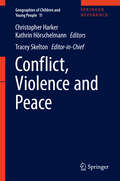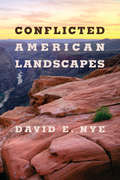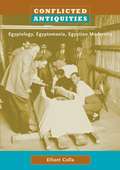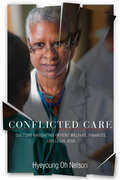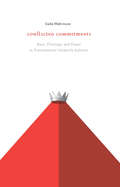- Table View
- List View
Conflict in Urban Development: A Comparison Between East and West (Routledge Revivals)
by Henri Goverde Arie Dekker Tadeusz Markowski Maria Ptaszynska-WoloczkowiczPublished in 1992, the aim of this book is to give both the professional planner and the student a feel for the current arguments alive in planning policy circles and to introduce relevant contemporary research. This book has developed out of a series of seminars run at the Institute of Planning Studies at Nottingham University as part of its continuing professional development programme. Each of the seminars brought together a variety of speakers who were involved with the topic under discussion from a different aspect – some with academic research experience and others with practical policy implementation. Most the nineteen contributors presented papers at this series of seminars, but some have been rewritten, others substantially revised, and several have been commissioned especially for this book. Four current policy issues are examined: provision and pedestrians; jobs for the inner cities; the homeless and the relationship between planners and developers. For each topic contributors were chosen who could approach the problem from a different point of view, the aim being to explore each topic with direct statements and straightforward arguments leading therefore to a more stimulating breadth of this view rather than a bland overview.
Conflict in the Archaeology of Living Traditions (One World Archaeology #Vol. 8)
by Robert LaytonThe first text to address the contentious issues raised by the pursuit of anthropology and archaeology in the world today. Calls into question the traditional, sometimes difficult relationship between western scholars and the contemporary cultures and peoples they study and can easily disturb.
Conflict in the Middle East (Routledge Library Editions: War and Security in the Middle East)
by P.J. VatikiotisThe Middle East is a continuing crisis area in world politics. This crisp and penetrating book, first published in 1971, analyses the historical development of the major issues in Arab politics, explains the conflicting interests now at stake in the Middle East and how the politics of the area were likely to develop. It examines, among other topics, the Palestine Liberation Movement, the prospects for Arab unity, and Great Power interference, and was written by one of the world’s leading scholars writing on the Middle East.
Conflict of Policies in Asia (Routledge Revivals)
by Thomas F. MillardIn 1899, the U.S.’s Hay Doctrine, more commonly referred to as the Open Door Policy, required that China’s trading ports remain open to all countries on an equal basis. Originally published in 1924, in the wake of World War I, this book looks at the variety of different policies between Western and Asian countries throughout the 19th and early 20th century and shows how the powerful influences of European imperialism and American political doctrine disrupted Asia’s development. This title is ideal for students interested in Asian Studies, Post-Colonial Studies and Politics.
Conflict, Citizenship and Civil Society (Studies in European Sociology)
by Carlo Ruzza Partick Baert Sokratis M. Koniordos Giovanna ProcacciThis book provides readers – students, researchers, academics, policy-makers, activists and interested non-specialists – with a sophisticated understanding of contemporary discussion, analysis and theorizing of issues pertaining to conflict, citizenship and civil society. It does so through thirteen pieces of most recent in-depth sociological research that delve on: challenges to citizenship, civil society and citizenship in early and late modernity, the reflexive imperative in transformations of civil society, social conflict challenges to social science approaches, methodology and explanatory power, gender, minorities-immigrants-refugees and the extension of citizenship, violence in modernity, the place of civil society for sociology, and postcolonialism, trauma, and civil society.
Conflict, Community, and the State in Late Imperial Sichuan: Making Local Justice (Routledge Studies in the Modern History of Asia)
by Quinn JaversExploring local practices of dispute resolution and laying bare the routine role of violence in the late-Qing dynasty, Conflict, Community, and the State in Late Imperial Sichuan demonstrates the significance of everyday violence in ordering, disciplining, and building communities. The book examines over 350 legal cases that comprise the "cases of unnatural death" archival file from 1890 to 1900 in Ba County, Sichuan province. The archive presents an untidy array of death, including homicides, suicides, and found bodies. An analysis of the muddled and often petty disputes found in these records reveals the existence of a local system of authority that disciplined and maintained daily life. Often relying on violence, this local justice system occasionally intersected with the state’s justice system, but was not dependent on it. This study demonstrates the importance of informal, local authority to our understanding of justice in the late Qing era. Providing a non-elite perspective on Qing power, law, justice, and the role of the state, this book will be of great interest to students and scholars of Chinese and Asian history, as well as legal history and comparative studies of violence.
Conflict, Continuity, and Change in Social Movements in Southeast Asia (Routledge Contemporary Southeast Asia Series)
by Abdul RohmanThis book demonstrates how preserving ideology and relationships with other activists affords social movements to persist over time amid limited resources and political opportunities in Southeast Asia. Examining two peace movements in Indonesia – the largest democratic country in Southeast Asia – to illuminate discontinuity, continuity, and change in social movements, the author uses a cultural approach to understanding why social movements persist. He argues that the activists’ memory, relationship with others, collective identity, and emotion are reasons for social movements to ascend and peak. This is a direct response to the argument that the availability of resources and political opportunities is the main ingredient for any social movements to rise. While having different fates, the two movements studied arose in the midst of violence between Christian and Muslim communities in Ambon, Indonesia: The Kopi Badati movement and Filterinfo. The book extends the applicability of the cultural approach in explaining why social movements discontinue, continue, and change over time, without discounting the importance of available resources and political opportunities. Addressing a gap in the existing social movement studies, the book explains why a social movement disbands and why the other manages to continue and change after achieving its immediate goal. It will be of interest to academics in the fields of Asian studies, (new)-media and communications, civil society, and international development.
Conflict, Crime, and the State in Postcommunist Eurasia
by Svante Cornell Michael JonssonIn the years after the collapse of the Soviet Union and its zone of influence, few insurgent groups had the resources necessary to confront regular armies. At the same time, state-sponsored financial support for insurgencies dramatically decreased. The pressing need to raise funds for war and the weakness of law enforcement in conflict zones create fertile conditions for organized crime; indeed, there is a mounting body of evidence correlating armed conflict and illicit economy, though the nature of this link and its impact on regional politics has not been well understood.Conflict, Crime, and the State in Postcommunist Eurasia explores the relationship between ideologically motivated insurgents, profit-motivated crime, and state institutions in eight conflict zones. Through detailed case studies, the contributors demonstrate how the operations and incentives of insurgents may emerge and shift over time: for some armed groups, crime can become an end in itself beyond a financial means, but not all armed groups equally adapt to illicit commerce. They also show how the criminalization of state institutions is a lingering concerns even after armed conflicts end. Conflict, Crime, and the State in Postcommunist Eurasia places the case studies along a continuum of political and criminal behavior, examining the factors that motivate insurgents to seek out criminal alliance, how this connection affects the dynamics of conflict, and what risks remain during postconflict transition. These findings will provide a better understanding of the types of challenges likely to confront peacekeeping and statebuilding endeavors in other parts of the world.Contributors: Jana Arsovska, Svante Cornell, Johan Engvall, Michael Jonsson, Alexandru Molcean, Niklas Nilsson, Murad Batal al-Shishani, Natalie Verständig.
Conflict, Culture and Identity in GP Training
by Jennifer L. JohnstonThis book explores the identity work and conflicted perspectives of general practitioner (GP) trainees working in hospitals in the UK. Drawing on empirical and theoretical scholarship, and privileging the analysis of social language-in-use, Johnston describes primary care medicine as a separate paradigm with its own philosophy, identity and practice. Casting primary and secondary care in historical conflict, the perceived lower status of primary care in the world of medicine is explored. Significant identity challenges ensue for GP trainees positioned at the coalface of conflict. Problematising structures of GP training and highlighting how complex historical power dynamics play out in medical training, the author advocates for radical change in how GPs are trained in order to manage the current primary care recruitment and retention crisis.
Conflict, Demand and Economic Development: Essays in Honour of Amit Bhaduri
by Deepankar Basu; Debarshi DasThis book presents a comprehensive overview of three key areas: heterodox macroeconomics, development economics and classical political economy. It offers an alternative macroeconomic framework to analyse policies with an emphasis on issues of equity and justice. With contributions by leading economists from across the world, it examines the growth and distribution of income; trade and finance in developing countries; classical political economy and Marxist theory; dualism in the US economy; economic crisis; and agrarian economy in poor countries. It explores themes such as the effect of an exogenous shock to wage share; Harrodian instability and Steindlian solutions; economics and politics of social democracy; the role of power in the macroeconomy; economic development through the promotion of domestic value chains; and reflections on primitive accumulation. Going beyond the neo-classical tradition, the volume opens up a new vista of economics by discussing unexplored questions. It provides a refreshing treatment of time-tested ideas as well as discussions of recent developments and current research. A major intervention in heterodox macroeconomics and a tribute to macroeconomist Amit Bhaduri, this book will be useful to scholars and researchers of economics, political economy, development studies, sociology, political science, public administration, economic theory, economic history, economic geography and critical studies, as well as professionals, economists and policymakers.
Conflict, Domination, and Violence: Episodes in Mexican Social History (Studies in Latin American and Spanish History #2)
by Carlos IlladesConflict, domination, violence-in this wide-ranging, briskly narrated volume from acclaimed Mexican historian Carlos Illades, these three phenomena register the pulse of a diverse, but inequitable and discriminatory, social order. Drawing on rich and varied historical sources, Illades guides the reader through seven signal episodes in Mexican social history, from rebellions under Porfirio Díaz's dictatorship to the cycles of violence that have plagued the country's deep south to the recent emergence of neo-anarchist movements. Taken together, they comprise a mosaic history of power and resistance, with artisans, rural communities, revolutionaries, students, and ordinary people confronting the forces of domination and transforming Mexican society.
Conflict, Education and People's War in Nepal (Nepal and Himalayan Studies)
by Sanjeev RaiThis book presents an overview of the democracy movement and the history of education in Nepal. It shows how schools became the battleground for the state and the Maoists as well as captures emerging trends in the field, challenges for the state and negotiations with political commitments. It looks at the factors that contributed to the conflict, and studies the politics of the region alongside gender and identity dynamics. One of the first studies on the subject, the book highlights how conflict and education are intrinsically linked in Nepal. It illustrates how schools became the centre of attention between warring groups and how they were used for political meetings and recruitment of fighters during the political transitions in a contested terrain in South Asia. It brings to the fore incidents of abduction and killing of teachers and students, and the use of children as porters for arms and ammunitions. Drawing extensively on both primary and secondary sources and qualitative analyses, the book provides the key to a complex web of relationships among the stakeholders during conflict and also models of education in post-conflict situations. This book will interest scholars and researchers in education, politics, peace and conflict studies, sociology, development studies, social work, strategic and security studies, contemporary history, international relations, and Nepal and South Asian studies.
Conflict, Migration, And The Expression Of Ethnicity
by Nancie L. GonzalezThis book sets forth some of the common understandings about conflict, migration, and the expression of ethnicity, together with a glimpse of how each presentation is inter-related. It discusses how conflict produces and is a product of migration, and ethnic phenomena are interwoven with both.
Conflict, Political Accountability and Aid
by Paul CollierPaul Collier’s contributions to development economics,and in regard to Africa in particular, have marked him out as one of the most influential commentators of recent times. His research has centred upon the causes and consequences of civil war, the effects of aid, and the problems of democracy in low-income and natural-resource-rich societies. His work has also enjoyed substantial policy impact, having seen him sit as a senior adviser to Tony Blair’s Commission on Africa and addressed the General Assembly of the United Nations This collection of Collier’s major writings, with assistance from Anke Hoeffler and Jan Gunning, and accompanied by a new introduction, provide the definitive account of a wide range of macroeconomic, microeconomic and political economy topics concerned with Africa. Within macroeconomics, there is a focus on external shocks, exchange rate and trade policies, whilst microeconomic topics focus upon labour and financial markets, as well as rural development. Collier’s book The Bottom Billion had become a landmark book and this summation of the research underpinning it will be a superb guide for all those concerned with African development.
Conflict, Politics and Crime: Aboriginal Communities and the Police
by Chris CunneenAboriginal people are grossly over-represented before the courts and in our gaols. Despite numerous inquiries, State and Federal, and the considerable funds spent trying to understand this phenomenon, nothing has changed. Indigenous people continue to be apprehended, sentenced, incarcerated and die in gaols. One part of this depressing and seemingly inexorable process is the behaviour of police. Drawing on research from across Australia, Chris Cunneen focuses on how police and Aboriginal people interact in urban and rural environments. He explores police history and police culture, the nature of Aboriginal offending and the prevalence of over-policing, the use of police discretion, the particular circumstances of Aboriginal youth and Aboriginal women, the experience of community policing and the key police responses to Aboriginal issues. He traces the pressures on both sides of the equation brought by new political demands.In exploring these issues, Conflict, Politics and Crime argues that changing the nature of contemporary relations between Aboriginal people and the police is a key to altering Aboriginal over-representation in the criminal justice system, and a step towards the advancement of human rights.
Conflict, Power, and the Landscape of Constitutionalism
by Gilles TaraboutThe book seeks to critically examine the implication of a constitution of law for a political society. It presents a collection of essays that seek to investigate how power acts on power, how limits produce excess, how separation of powers produces the union of powers (sanctified by the very constitution that had guaranteed the division in the first place), and how the theory of separation is, at the same time, a myth and a reality. At the backdrop of the book, of course, is the theory that every good constitution rigorously separates the legislature, the executive, and the judiciary from one another to guarantee the independence of each of these powers, such that this separation results in life, liberty, and security. If a constitution, however, symbolises and produces power, precisely because it separates one site of power from another, it follows that it is power itself that is the limit of power. Constitutionalism as a political culture of laws, therefore, must explain the dynamics of power.The book addresses both constitutions and the societies in which they emerge. Many of the essays in this collection show how institutional practices originating from a legal text create a matrix of power that owes its life, neither to a contract between men, nor between the state and men, nor even between the society and men, but rather to relations established, organized, and formalized by laws. The collection is significant because it gives colonial and post-colonial experiences a justified place in studies of law and constitutionalism, for it shows that while Montesquieu, Kant, and Burke each in their own way were promoting the spirit of laws, a more significant history of law-making was being enacted in order to defend a particular rule, and a particular type of government on another side of the world. Based on comparative studies in several countries across three continents, the book centrally deals with issues of constitutionalism, politica
Conflict, Security and Development: An Introduction
by Paul Jackson Danielle BeswickThis textbook draws on academic theory, field research and policy developments to provide an overview of the connections between security and development, before, during and after conflict. This 2nd edition is revised and updated to take account of changes that have occurred in both policy and academic arenas which are relevant to students and practitioners in this area. In an interdependent world it is often argued that the challenges of underdevelopment and insecurity have global implications. This textbook charts an accessible course through these complex debates, providing a comprehensive introduction for those encountering these issues for the first time. The main aims of the revised edition are: • to set out how thinking on conflict, security and development has changed over time and continues to evolve; • to explore the consequences of these changes, particularly for the theory and practice of development and security promotion; • to introduce a range of case studies from across the globe, in order to explore the implications of a combined approach to security and development. The authors are experienced in both the theory and the practice of this field, and illustrate the links between conflict, security and development with practical examples, drawing on key case studies from the past twenty years. Each chapter is informed by student pedagogy and the book will be essential reading for all students of development studies, war and conflict studies, and human security and is recommended for students of international security and IR in general.
Conflict, Security and Development: An Introduction
by Paul Jackson Danielle BeswickThis textbook draws on academic theory, field research and policy developments to provide an overview of the connections between security and development, before, during and after conflict. This third edition is revised and updated to take account of changes that have occurred in both policy and academic arenas which are relevant to students and practitioners in this area. In addition, there is a new chapter on memory and memorialisation after conflict. In an interdependent world, it is often argued that the challenges of underdevelopment and insecurity have global implications. This textbook charts an accessible course through these complex debates, providing a comprehensive introduction for those encountering these issues for the first time. The main aims of the revised edition are: to set out how thinking on conflict, security and development has changed over time and continues to evolve; to explore the consequences of these changes, particularly for the theory and practice of development and security promotion; to introduce a range of case studies from across the globe, in order to explore the implications of a combined approach to security and development. The authors are experienced in both the theory and the practice of this field, and illustrate the links between conflict, security and development with practical examples, drawing on key case studies from the past twenty years. Each chapter is informed by student pedagogy, and the book will be essential reading for all students of development studies, war and conflict studies, and human security, and is recommended for students of international security and international relations in general.
Conflict, Terrorism and the Media in Asia (Media, Culture and Social Change in Asia)
by Benjamin ColeThere are many different kinds of sub-national conflicts across Asia, with a variety of causes, but since September 11, 2001 these have been increasingly portrayed as part of the global terrorist threat, to be dealt with by the War on Terror. This major new study examines a wide range of such conflicts, showing how, despite their significant differences, they share the role of the media as interlocutor, and exploring how the media exercises this role. The book raises a number of issues concerning how the media report different forms of political violence and conflict, including issues of impartiality in the media's relations with governments and insurgents, and how the focus on the 'War on Terror' has led to some forms of violence - notably those employed by states for political purposes - to be overlooked. As the issue of international terrorism remains one of the most pressing issues of the modern day, this is a significant and important book which will interest the general reader and scholars from all disciplines.
Conflict, Violence and Peace (Geographies of Children and Young People #11)
by Kathrin Hörschelmann Christopher HarkerThis book broadens debates on violence, conflict and peace by examining the crucial role played by children and youth. Recent social, political and geographical research has demonstrated that children and youth are deeply impacted by war and violence and that, despite strong cultural assumptions about children's needs for protection, their wellbeing continues to be an afterthought rather than a central concern of global politics. Children and youth have also been shown to be more than just passive victims of violence. They are multiply enrolled in conflict as well as in the politics of reconciliation and peace. The handbook illustrates these complexities through a wide range of chapters that review key literatures on the topic from geographical perspectives and in diverse global contexts. Demonstrating the centrality of space for children and youth's positioning within, and responses to, violence and conflict, the chapters engage with novel conceptual approaches and up-to-date empirical research to develop nuanced understandings of different forms of violence in relation to global and local topographies of power and young people's subjectivities and agencies. While offering rich insights into context-specific dynamics, similarities and connections are also outlined between children and youth in the majority and minority world.
Conflicted American Landscapes
by David E. NyeHow conflicting ideas of nature threaten to fracture America's identity.Amber waves of grain, purple mountain majesties: American invest much of their national identity in sites of natural beauty. And yet American lands today are torn by conflicts over science, religion, identity, and politics. Creationists believe that the Biblical flood carved landscapes less than 10,000 years ago; environmentalists protest pipelines; Western states argue that the federal government's land policies throttle free enterprise; Native Americans demand protection for sacred sites. In this book, David Nye looks at Americans' irreconcilably conflicting ideas about nature.A landscape is conflicted when different groups have different uses for the same location—for example, when some want to open mining sites that others want to preserve or when suburban development impinges on agriculture. Some landscapes are so degraded from careless use that they become toxic &“anti-landscapes.&” Nye traces these conflicts to clashing conceptions of nature—ranging from pastoral to Native American to military–industrial—that cannot be averaged into a compromise. Nye argues that today&’s environmental crisis is rooted in these conflicting ideas about land. Depending on your politics, global warming is either an inconvenient truth or fake news. America&’s contradictory conceptions of nature are at the heart of a broken national consensus.
Conflicted Antiquities: Egyptology, Egyptomania, Egyptian Modernity
by Elliott CollaConflicted Antiquities is a rich cultural history of European and Egyptian interest in ancient Egypt and its material culture, from the early nineteenth century until the mid-twentieth. Consulting the relevant Arabic archives, Elliott Colla demonstrates that the emergence of Egyptology--the study of ancient Egypt and its material legacy--was as consequential for modern Egyptians as it was for Europeans. The values and practices introduced by the new science of archaeology played a key role in the formation of a new colonial regime in Egypt. This fact was not lost on Egyptian nationalists, who challenged colonial archaeologists with the claim that they were the direct heirs of the Pharaohs, and therefore the rightful owners and administrators of ancient Egypt's historical sites and artifacts. As this dispute developed, nationalists invented the political and expressive culture of "Pharaonism"--Egypt's response to Europe's Egyptomania. In the process, a significant body of modern, Pharaonist poetry, sculpture, architecture, and film was created by artists and authors who looked to the ancient past for inspiration. Colla draws on medieval and modern Arabic poetry, novels, and travel accounts; British and French travel writing; the history of archaeology; and the history of European and Egyptian museums and exhibits. The struggle over the ownership of Pharaonic Egypt did not simply pit Egyptian nationalists against European colonial administrators. Egyptian elites found arguments about the appreciation and preservation of ancient objects useful for exerting new forms of control over rural populations and for mobilizing new political parties. Finally, just as the political and expressive culture of Pharaonism proved critical to the formation of new concepts of nationalist identity, it also fueled Islamist opposition to the Egyptian state.
Conflicted Care: Doctors Navigating Patient Welfare, Finances, and Legal Risk
by Hyeyoung Oh NelsonAn eye-opening and compelling ethnography about how doctors make decisions The oath that doctors take to "do no harm" suggests that patient welfare is at the center of what it means to be a successful medical professional. It is also understood, however, that hospitals are not only vessels for medical care—they are businesses, educational institutions, and complex bureaucracies with intricate codes of etiquette that dictate how each staff member should approach situations with patients. In Conflicted Care, Hyeyoung Oh Nelson provides an in-depth look at the decision-making processes of physicians at a large, prestigious academic medical center—that she calls Pacific Medical Center—and finds that more often than not patient wellbeing is only one of several factors governing day-to-day decisions. The steps physicians take reveal a kind of hidden curriculum of the medical world, one that is guided by status and hierarchy, bureaucracy, norms for consulting with third-parties, regulations for interactions with patients, and medical uncertainty. While at an institutional and individual level patient care continues to be integral to everything the physicians do, they are forced to reconcile that vow with these other, often-conflicting internal logics. Harm, Nelson argues, is thus built into the practice of medicine in the United States. This harm can take the form of unnecessary treatments and consultations or inadequate treatment for pain to motivate specialist intervention that would otherwise be resisted. These and other practices have the overall consequence of significantly driving up inpatient care costs, which then results in patients forgoing needed, ongoing treatment once they receive their medical bills. Drawing on a deep ethnography of physicians in the Internal Medicine Service unit, Nelson offers a sharp assessment of current policies aimed at alleviating medical costs and explains why they are ineffective. She concludes by offering novel policy and practice recommendations for health care practitioners, policy makers, and healthcare institutions.
Conflicted Commitments
by Gada MahrouseConflicted Commitments analyzes a form of non-violent, direct transnational solidarity in which activists from the global North travel to support and protect people in the global South. Gada Mahrouse contends that this brand of activism is a compelling site of racialized power relations and is highly instructive for a nuanced understanding of systems of race. Mahrouse argues that the individuals who partake in this form of activism consciously deploy their white, western privilege to offer support and protection to those facing threats of violence. Moreover, given that this type of activism asserts itself as an exemplary form of anti-racist commitment, it illustrates that well-meaning practices can inadvertently reproduce racialized power structures that are embedded in imperial and colonial legacies. Mahrouse focuses on Palestine and Iraq in the post-9/11 era to contemplate the contemporary challenges that these regions pose for solidarity activism. By exploring how individual activists manage and negotiate their dominant positioning in these encounters, Mahrouse reflects more broadly on the ethics of social justice strategies in an increasingly transnational world. A detailed study of the racialized complexities and contradictions inherent in transnational solidarity activism, Conflicted Commitments makes a significant contribution to critical race and feminist studies.
Conflicted Commitments: Race, Privilege, and Power in Solidarity Activism
by Gada MahrouseConflicted Commitments analyzes a form of non-violent, direct transnational solidarity in which activists from the global North travel to support and protect people in the global South. Gada Mahrouse contends that this brand of activism is a compelling site of racialized power relations and is highly instructive for a nuanced understanding of systems of race. Mahrouse argues that the individuals who partake in this form of activism consciously deploy their white, western privilege to offer support and protection to those facing threats of violence. Moreover, given that this type of activism asserts itself as an exemplary form of anti-racist commitment, it illustrates that well-meaning practices can inadvertently reproduce racialized power structures that are embedded in imperial and colonial legacies. Mahrouse focuses on Palestine and Iraq in the post-9/11 era to contemplate the contemporary challenges that these regions pose for solidarity activism. By exploring how individual activists manage and negotiate their dominant positioning in these encounters, Mahrouse reflects more broadly on the ethics of social justice strategies in an increasingly transnational world. A detailed study of the racialized complexities and contradictions inherent in transnational solidarity activism, Conflicted Commitments makes a significant contribution to critical race and feminist studies.
